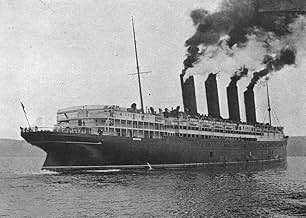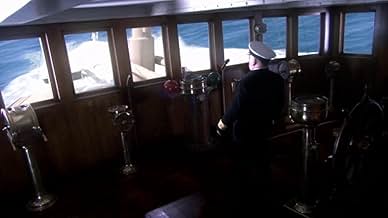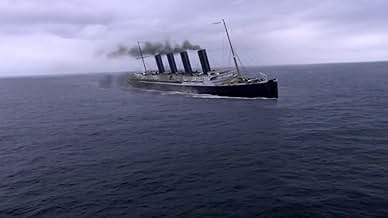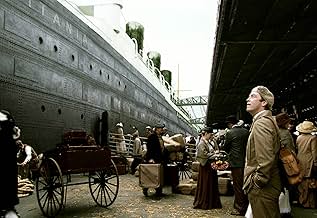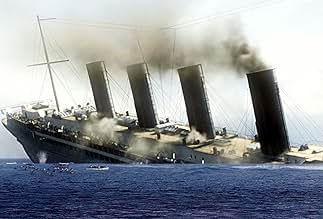A dramatization of the notorious World War I torpedoing of the ocean liner, RMS Lusitania.A dramatization of the notorious World War I torpedoing of the ocean liner, RMS Lusitania.A dramatization of the notorious World War I torpedoing of the ocean liner, RMS Lusitania.
- Director
- Writers
- Stars
Florian Panzner
- Lt. Capt. Schwieger
- (as Florian Panzer)
Madeleine Garrood
- Avis Dolphin
- (as Maddeleine Garrood)
Andre Weideman
- Johnston
- (as Andre Weiderman)
Stephen Jennings
- Carson
- (as Steven Jennings)
Robyn LeAnn Scott
- Peggy
- (as Robyn Scott)
- Director
- Writers
- All cast & crew
- Production, box office & more at IMDbPro
Featured reviews
"Lusitania, murder on the Atlantic" may well be considered as a cheaper version of the 1998-blockbuster "Titanic", starring Kate Winslet and Leonardo DiCaprio. Although the Lusitania-film provides good entertainment, it leads you on false tracks when it comes to history.
The big question with Lusitania, unsolved to this day: the ship was too big to sink with only one torpedo. However, historically it is beyond doubt that she was sunk by just one torpedo. Even more so, after being hit she sank pretty fast.
Every fisherman at Ireland's Southern coast can exactly point out the location of the Lusitania-wreck, about 100 meters down. So the wreck has already been investigated by several diving parties, among them one led by Robert Ballard in 1993. Ballard is the American who discovered the wrecks of the "Titanic", as well as that of Hitler's famous battleship "Bismarck". Ballard thinks that the torpedo hit one of Lusitania's coal-stores, making the coal-dust explode. Carrying this explosion on to neighboring coal-stores. Later on another diving party found considerable quantities of unexploded ammunition inside the Lusitania.
Given its status as a passenger-ship carrying civilians, Lusitania's sinking in May 1915 did the German cause in World War I no good.
The film states that this disaster marked a turning point in the history of warfare, by dropping humanity and chivalry completely. This is wrong: for instance, when the German army invaded Belgium less than a year before, their behavior against defenseless Belgian civilians still evokes horror to this day.
Nevertheless Lusitania's sinking functioned well to win over the USA for their military participation in World War I. In Belgium people do not speak English, so German atrocities over there had been missed by the people of the distant USA.
Another false understanding widely current in the Anglo-Saxon part of the world: in shipping-disasters Lusitania comes only second after Titanic.
Counting in lost human lives, the greatest shipping disaster of all was the torpedoing of the German vessel "Wilhelm Gustloff" by a Soviet-Russian submarine. This happened in January 1945, when the Hitler-vessel carried about 10.000 refugees from Germany's threatened Eastern provinces westwards to safety. Nearly all these people drowned in the icy Baltic Sea, making their number of casualties at least four times as big as that of the Titanic.
The big question with Lusitania, unsolved to this day: the ship was too big to sink with only one torpedo. However, historically it is beyond doubt that she was sunk by just one torpedo. Even more so, after being hit she sank pretty fast.
Every fisherman at Ireland's Southern coast can exactly point out the location of the Lusitania-wreck, about 100 meters down. So the wreck has already been investigated by several diving parties, among them one led by Robert Ballard in 1993. Ballard is the American who discovered the wrecks of the "Titanic", as well as that of Hitler's famous battleship "Bismarck". Ballard thinks that the torpedo hit one of Lusitania's coal-stores, making the coal-dust explode. Carrying this explosion on to neighboring coal-stores. Later on another diving party found considerable quantities of unexploded ammunition inside the Lusitania.
Given its status as a passenger-ship carrying civilians, Lusitania's sinking in May 1915 did the German cause in World War I no good.
The film states that this disaster marked a turning point in the history of warfare, by dropping humanity and chivalry completely. This is wrong: for instance, when the German army invaded Belgium less than a year before, their behavior against defenseless Belgian civilians still evokes horror to this day.
Nevertheless Lusitania's sinking functioned well to win over the USA for their military participation in World War I. In Belgium people do not speak English, so German atrocities over there had been missed by the people of the distant USA.
Another false understanding widely current in the Anglo-Saxon part of the world: in shipping-disasters Lusitania comes only second after Titanic.
Counting in lost human lives, the greatest shipping disaster of all was the torpedoing of the German vessel "Wilhelm Gustloff" by a Soviet-Russian submarine. This happened in January 1945, when the Hitler-vessel carried about 10.000 refugees from Germany's threatened Eastern provinces westwards to safety. Nearly all these people drowned in the icy Baltic Sea, making their number of casualties at least four times as big as that of the Titanic.
Indeed, this one is remarkably controlled, but it does include key facts that the British wanted covered up:
And much more. Anybody who argues anything else has not studied the subject in depth; one need only consult THE authority on the subject, Patrick Beesley, in his authoritative Room 40 to know this. None of this is "politics": it's all facts.
- that their embargo of Germany was the first and bigger war crime;
- that Churchill wanted the Lusitania sunk, and in typically murderous fashioned schemed to make it happen;
- that the explosion of illegally carried war materials, especially gun cotton, caused the second and greater explosion;
- that the Admiralty first covered up and then destroyed all materials relating to the incident;
And much more. Anybody who argues anything else has not studied the subject in depth; one need only consult THE authority on the subject, Patrick Beesley, in his authoritative Room 40 to know this. None of this is "politics": it's all facts.
Over a century ago, there was a time when warfare between nations was expected to be fought with some semblance of chivalry, and noncombatants were to be protected from harm.
Any semblance of that finally came to an end on 7 May, 1915.
Based on true events, this docudrama tells the story of one of the most pivotal events of the First World War, the sinking of the RMS Lusitania. This was the other British liner that went down tragically, but whose death could not have been more different. While not as lavish a production as the James Cameron movie, "Lusitania" nevertheless gives the viewer a reasonably accurate picture of the ship and its end. The performances are good, the story pretty much follows the historic record, and the special effects are convincing enough in depicting the death of the doomed liner. One of the movie's best scenes intersperses actual film footage of the Lusitania leaving New York on her final voyage, a sobering and haunting moment.
There's also an important backstory, namely the reason why the Lusitania was attacked in the first place. Both Lusitania and her sister Mauretania were listed as auxiliary cruisers in the Royal Navy registry. The ship was also loaded with munitions, in violation of international law. Through their agents in New York, the Germans were aware of this. There was also the fact that Winston Churchill, head of the Admiralty, wanted to create an incident at sea to bring America into the allied cause.
There are of course, some flaws in this production. For instance, the actor portraying Captain Turner in no way resembles the real person. The late Ian Holm would have been a better choice. However ,the main criticism of this motion picture is sometimes it gives the impression of being "Titanic" meets "Das Boot".
But when the torpedo strikes the hull and the contraband munitions explode, all similarities come to an end, and the mayhem that was the sinking is shown. People are drowned, pulled under, and meet other horrific ends. Unlike the Titanic, the band did not play on, the lovers did not unite, there was no nobility displayed by the passengers, and the Captain did not go down with the ship. This is where this film truly becomes the "Anti-Titanic". But even this cannot fully bring forth the nightmare that was the Lusitania. To make a comparison, the Titanic took two and a half hours to go under, while the Lusitania, a ship 90 percent the Titanic's size, went down in just 18 minutes. The percentage of loss of life was significantly higher, with 1200 souls lost out of 2000 aboard, including 120 Americans.
The international condemnation of Germany that followed this horrific loss of life was near unanimous. Like a prairie fire a wave of shock and indignation spread throughout America, and none other than former President Theodore Roosevelt declared the Lusitania's sinking to be a "barbarous act of piracy". President Woodrow Wilson however, decided to err on the side of caution. Nevertheless, the fuse was lit for America's eventual entry into World War I.
Any semblance of that finally came to an end on 7 May, 1915.
Based on true events, this docudrama tells the story of one of the most pivotal events of the First World War, the sinking of the RMS Lusitania. This was the other British liner that went down tragically, but whose death could not have been more different. While not as lavish a production as the James Cameron movie, "Lusitania" nevertheless gives the viewer a reasonably accurate picture of the ship and its end. The performances are good, the story pretty much follows the historic record, and the special effects are convincing enough in depicting the death of the doomed liner. One of the movie's best scenes intersperses actual film footage of the Lusitania leaving New York on her final voyage, a sobering and haunting moment.
There's also an important backstory, namely the reason why the Lusitania was attacked in the first place. Both Lusitania and her sister Mauretania were listed as auxiliary cruisers in the Royal Navy registry. The ship was also loaded with munitions, in violation of international law. Through their agents in New York, the Germans were aware of this. There was also the fact that Winston Churchill, head of the Admiralty, wanted to create an incident at sea to bring America into the allied cause.
There are of course, some flaws in this production. For instance, the actor portraying Captain Turner in no way resembles the real person. The late Ian Holm would have been a better choice. However ,the main criticism of this motion picture is sometimes it gives the impression of being "Titanic" meets "Das Boot".
But when the torpedo strikes the hull and the contraband munitions explode, all similarities come to an end, and the mayhem that was the sinking is shown. People are drowned, pulled under, and meet other horrific ends. Unlike the Titanic, the band did not play on, the lovers did not unite, there was no nobility displayed by the passengers, and the Captain did not go down with the ship. This is where this film truly becomes the "Anti-Titanic". But even this cannot fully bring forth the nightmare that was the Lusitania. To make a comparison, the Titanic took two and a half hours to go under, while the Lusitania, a ship 90 percent the Titanic's size, went down in just 18 minutes. The percentage of loss of life was significantly higher, with 1200 souls lost out of 2000 aboard, including 120 Americans.
The international condemnation of Germany that followed this horrific loss of life was near unanimous. Like a prairie fire a wave of shock and indignation spread throughout America, and none other than former President Theodore Roosevelt declared the Lusitania's sinking to be a "barbarous act of piracy". President Woodrow Wilson however, decided to err on the side of caution. Nevertheless, the fuse was lit for America's eventual entry into World War I.
I saw the docudrama today, thanks to Youtube, and can't support the criticism of the two other reviews here at all. Imho this BBC movie is a very good effort at educating the public about this crucial episode of history, regarding the constraints of the budget and the running time of the movie.
As a German citizen, I am, of course, not a totally impartial party (even though I try hard to be), but neither are British nor American commenters. However, I have read one of the most comprehensively sourced books on the subject, Colin Simpson's "The Lusitania", as well as countless in formations on the Internet and I'm basing my judgment on the facts that historians agree on, something that is lacking from both other reviews. And, as I see it, this BBC film got the most important facts right, while at the same time offering great acting and a storyline that shows the human side of the tragedy.
To the facts: - The Lusitania transported ammunition for the British war efforts, and this has been proved with documentary evidence. The movie mentions the fact, without going into the length of telling us that not only British officials knew this, but also US ones, as well as the German intelligence service. Since the complex US and German subplot would have taken a lot of time to tell (and introduce a lot of additional players), it is understandable that the movie leaves this side out. However, personally, I would have liked that a least a mention of the overwhelmingly pro-British tendency of the Wilson administration (especially the role of Col. House) would have been made, but it may have made the storyline too confusing.
Only the most important facts, and imho they are covered in a fair and still entertaining way by the movie. It would have been impossible to show every detail in a 90 minute feature, but the viewers get a good summary, which stay close to the view of the historians. And there isn't an especially pro-German bias (hey, it's a BBC production!). The hypocritical stance of the German Kaiser and his Admirals, who didn't want to be remembered of their own orders after public opinion turned against them is exposed, and German sub captain Schwieger is shown as a somewhat weak character, drawn between ambition, orders, and what may still have been left of ethical values. If there's any bias at all it's pro-American, because US officials, who put their countrymen into danger by deliberately ignoring the illegal transport of war supplies on a British passenger ship, aren't given any scrutiny at all. But, OK, this sideline would have taken another 20 minutes or so to tell.
So, all in all, a very good docudrama combining historical facts with good storytelling an cinematographic values. The special effects, the appearance of the Lusitania and the sub, don't look too cheap (which is often the problem with docudramas), also the use of historical coverage is accomplished in a convincing way. Taking also in consideration the good acting, especially the performances of John Hannah ("Four Weddings And A Funeral") and Adrian Topol, this movie deserves 8-9 out of 10 points. Job well done, BBC!
As a German citizen, I am, of course, not a totally impartial party (even though I try hard to be), but neither are British nor American commenters. However, I have read one of the most comprehensively sourced books on the subject, Colin Simpson's "The Lusitania", as well as countless in formations on the Internet and I'm basing my judgment on the facts that historians agree on, something that is lacking from both other reviews. And, as I see it, this BBC film got the most important facts right, while at the same time offering great acting and a storyline that shows the human side of the tragedy.
To the facts: - The Lusitania transported ammunition for the British war efforts, and this has been proved with documentary evidence. The movie mentions the fact, without going into the length of telling us that not only British officials knew this, but also US ones, as well as the German intelligence service. Since the complex US and German subplot would have taken a lot of time to tell (and introduce a lot of additional players), it is understandable that the movie leaves this side out. However, personally, I would have liked that a least a mention of the overwhelmingly pro-British tendency of the Wilson administration (especially the role of Col. House) would have been made, but it may have made the storyline too confusing.
- Not only ammunition, but also military personnel on the way to the war zone was transported. The movie doesn't show this, probably because it would have necessitated to introduce additional characters.
- As the movie mentions, the Lusitania was indeed on the list of British auxiliary cruisers. What the filmmakers doesn't tell us is that even basements for naval guns had been installed on the Lusitania after the war. Among passengers and staff, there were even rumours and that the guns were already hidden on the ship. Also mentioned by the BBC, contrary to agreed rules of naval warfare, Admiralty had issued orders to the merchant marine calling for deliberately ramming of submarines.
- It's a fact that British officials deliberately asked how the US would react if American citizen would be killed on a British ship. This is shown in the movie, even though it is left to the judgment of the viewers if and how this influenced the Admiralty in their decisions. The movie just shows the known facts, without taking a clear stance, which is a good idea regarding the lack of decisive evidence.
- The Germans had declared the waters an unrestricted war zone, and really warned passengers in the newspapers. The Lusitania, as a well known British ship, was in imminent danger, while at the same time neutrals, like American vessels, would have been relatively safe. Like the movie showed, it was dangerous ignorance in combination with misguided believe in the Admiralty safety promises that led many passengers to ignore the grave risk.
- The movie shows only one torpedo being fired. This is in accordance with German documents and testimonies, and the established view of historians worldwide. There has never been compelling evidence that more torpedoes were fired. The question, why the Lusitania sank so fast has never really been answered, the most recent view being that both the specific construction of the Ship (longitudinal bulkheads!) and an explosion of a boiler played a role. The movie doesn't show how the second explosion happened and so stays neutral on this question. Imho a good idea, because this isn't essential to the story.
- The Admiralty really did take an unfair stance in the court case, as depicted in the movie. Also, the order for the so called "advised course" contradicted other standing orders, as well as the necessities of navigation. And many important information were never relayed to the Lusitania. What isn't shown is that the Admiralty even presented doctored wireless logs, and that the judge noticed that. Maybe it would have been good to include this in the story, since it adds to the understanding of the administration-critical stance of the Judge, and of the consequent verdict.
Only the most important facts, and imho they are covered in a fair and still entertaining way by the movie. It would have been impossible to show every detail in a 90 minute feature, but the viewers get a good summary, which stay close to the view of the historians. And there isn't an especially pro-German bias (hey, it's a BBC production!). The hypocritical stance of the German Kaiser and his Admirals, who didn't want to be remembered of their own orders after public opinion turned against them is exposed, and German sub captain Schwieger is shown as a somewhat weak character, drawn between ambition, orders, and what may still have been left of ethical values. If there's any bias at all it's pro-American, because US officials, who put their countrymen into danger by deliberately ignoring the illegal transport of war supplies on a British passenger ship, aren't given any scrutiny at all. But, OK, this sideline would have taken another 20 minutes or so to tell.
So, all in all, a very good docudrama combining historical facts with good storytelling an cinematographic values. The special effects, the appearance of the Lusitania and the sub, don't look too cheap (which is often the problem with docudramas), also the use of historical coverage is accomplished in a convincing way. Taking also in consideration the good acting, especially the performances of John Hannah ("Four Weddings And A Funeral") and Adrian Topol, this movie deserves 8-9 out of 10 points. Job well done, BBC!
People always talk about Titanic this Titanic that, it was an accident waiting to happen. People died yes on that ship where it could have been averted. The Lusitania however, was the beginning and the end for the Germans and eventually lose World War One. The sinking of the ship was a barbaric act and no doubt a sad ending for those who died. Unlike the Titanic where there wasn't enough lifeboats, Lusitania had all the safety feature that was built into after Titanic like double hull and more then enough lifeboat for the passenger, but wasn't build to stop a torpedo.
The movie itself was really good. I'm surprise that guy from Mummy was in the movie and instead of being a comic relief, gave a very serious acting in the movie where he was a victim on the ship. The other people in the movie also showed the same and for a quality we expected in a docu-drama movie, the movie more the met my expectation. The sinking was very well done and was more sad then Titanic. Thank goodness there is none of this Jack and Rose crap in it.
Otherwise, a very well made movie and one that should be a reminder about how Lusitania became a pawn in the World War.
The movie itself was really good. I'm surprise that guy from Mummy was in the movie and instead of being a comic relief, gave a very serious acting in the movie where he was a victim on the ship. The other people in the movie also showed the same and for a quality we expected in a docu-drama movie, the movie more the met my expectation. The sinking was very well done and was more sad then Titanic. Thank goodness there is none of this Jack and Rose crap in it.
Otherwise, a very well made movie and one that should be a reminder about how Lusitania became a pawn in the World War.
Did you know
- TriviaThe U-20 set was the original U-96 set used in Le Bateau (1981). The Type U-19 of World War I and Type VIIC of World War II had similar internal dimensions.
- GoofsOn at least two occasions the captain of the U 20 gives the order to "blow ballast" when he wants to dive the submarine. This order would result in all water being blown out of the ballast tanks and should only be given to surface the boat. In order to dive a submarine one must flood the ballast tanks with water.
- Quotes
Captain Turner: They're not interested in the truth.
- Crazy creditsAdrian Topol's character name is pronounced Voegele in the German dialogue and is spelled this way in the accompanying English subtitles. However in the credits it is spelled Vogele. Correct German spelling uses either "ö" (o with an umlaut) or else "oe".
- ConnectionsFeatured in Titanic al detalle (2013)
Details
- Release date
- Countries of origin
- Languages
- Also known as
- Sinking of the Lusitania: Terror at Sea
- Production companies
- See more company credits at IMDbPro
Contribute to this page
Suggest an edit or add missing content

Top Gap
By what name was Lusitania: Murder on the Atlantic (2007) officially released in India in English?
Answer
